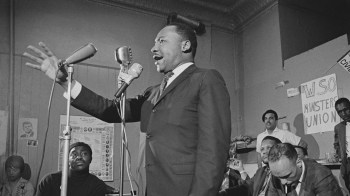
Do we need to track pressure cooker sales?

Bomb-making materials can be so mundane, it’s almost surreal.
“What you’re looking for, basically, is a metal container that can be enclosed and locked down,” said James Lewis, a senior fellow at the Center for Strategic and International Studies.
Ahmad Khan Rahami has been accused of placing a series of bombs in New York City and New Jersey last weekend. One thing investigators don’t yet know — the reason behind the bombings. One thing they do: at least two of the devices were made using pressure cookers and cell phones. Similar materials have also been used in previous terrorist attacks, which means that even the pots and pans we have in our own kitchen cabinets can be suspect.
“I was involved in discussions a long time ago about pie tins,” said Lewis, who previously worked with the Department of State. “Some people said, ‘geeze we ought to find a way to control pie tins.’ And it’s like, get a grip.”
The bombs thought to have been planted last weekend by suspect Rahami, noted Lewis, also contained Christmas lights and cell phones. “You have to ask yourself what’s really feasible in a commercial market and pursuing everything that can do harm is really a fruitless task.”
Instead, said Lewis, government should keep an eye on people — the ones who make bombs. “You have to ask what’s the tactic, what’s the strategy that’s going to have the best payoff?” he asked. “Unfortunately, it might be surveillance. And that might have implications for privacy. But if you can surveill communications, you’re more likely to find out who’s planning an attack, as opposed to surveilling who’s buying pressure cookers.”
However, if we really wanted to track the sale of pressure cookers, we could.
“It’s certainly technically possible,” said William Banks, director of the Institute for National Security and Counterterrorism at Syracuse University. He says look no farther than fertilizer and Oklahoma City in 1995. Fertilizer was the key component in the massive bombing that killed 168 people.
“After the Oklahoma City bombings, we decided to tag and monitor the sale and use of many of those materials,” Banks said. “We could do that again.”
Except, Banks said, we shouldn’t. “We can’t watch every item on every transaction that all of us are involved in every day,” he said. “Retailers and wholesalers would say ‘every time I sell a pressure cooker, I’ve got to fill out a piece of paper?” Nor, Banks said, “do any of us want to live in that kind of society where everything we do, every item we purchase is tracked by the government in some way.”
One morning this week, Preet Virdi was shopping for a sald bowl at a Brooklyn housewares store that also sells several models of pressure cookers. She said she thinks neither watching what people buy nor surveillance can prevent violent attacks.
“We need to engage the public discourse in something much more nuanced,” she said. “People need to know that extremism is not about a pressure cooker, it’s about why that person bought a pressure cooker to begin with.”
A spokesperson from the FBI Office of Public Affairs said she was unable to provide any information on the tracking, or lack of tracking, of pressure cookers. The NYPD said it didn’t have a spokesperson available to comment.
Luckily, most of the time, people purchase pressure cookers because they just want to make stew.
There’s a lot happening in the world. Through it all, Marketplace is here for you.
You rely on Marketplace to break down the world’s events and tell you how it affects you in a fact-based, approachable way. We rely on your financial support to keep making that possible.
Your donation today powers the independent journalism that you rely on. For just $5/month, you can help sustain Marketplace so we can keep reporting on the things that matter to you.


















